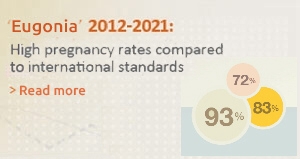The presence of sperm antibodies is generally a recognized cause of infertility, although their mode of action is not well known. These antibodies cause sperm agglutination that influences their motility, their interaction with cervical mucus, and penetration in the oocyte, resulting in fertilization failure. Also, it has been shown that sperm antibodies affect the embryos development, particularly in the 6-8 cell stage on the 3rd day of culture or before the blastocyst’s formation on the 5th or 6th day. These antibodies can be produced after inflammation, trauma or surgery.
The most common tests are: the MAR test (Mixed Antiglobulin Reaction, the SPAT test (Sperm Agglutination Test) and the immunobead test.
According to World Health Organization (WHO) guidelines, the presence of sperm antibodies may have negative effects on pregnancy when 50% or more of the sample's motile spermatozoa are agglutinated. In cases in which the test indicates the presence of sperm antibodies> 50%, ICSI is recommended.






























